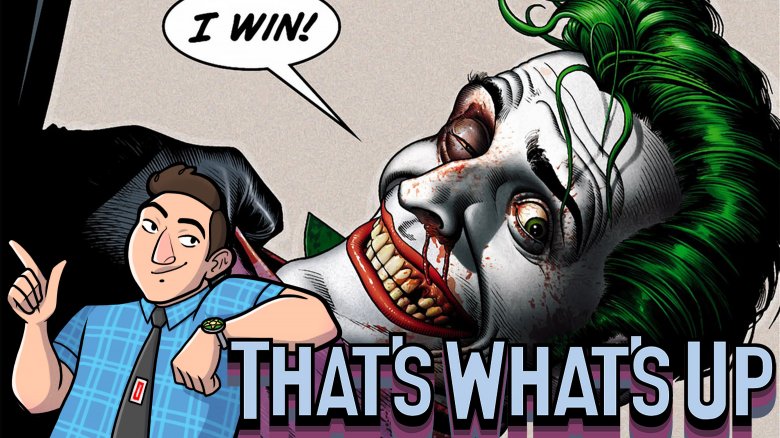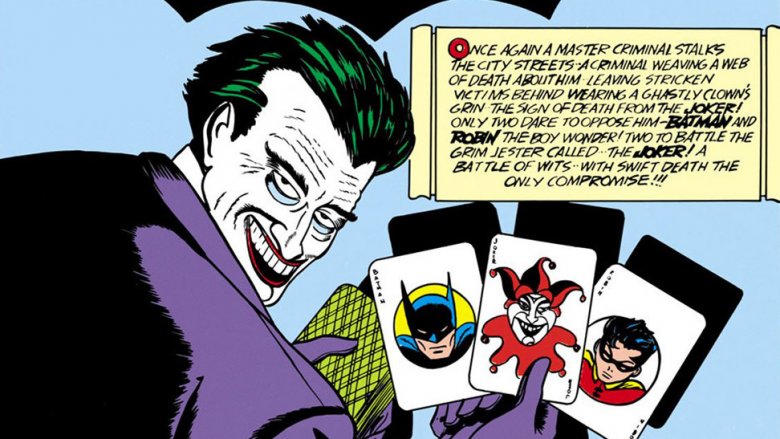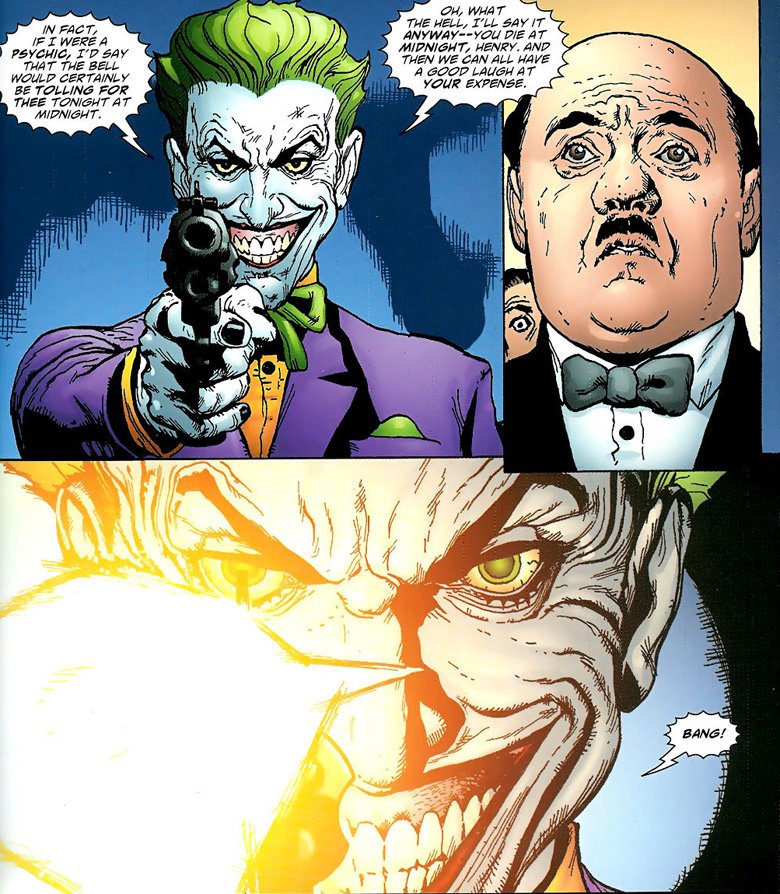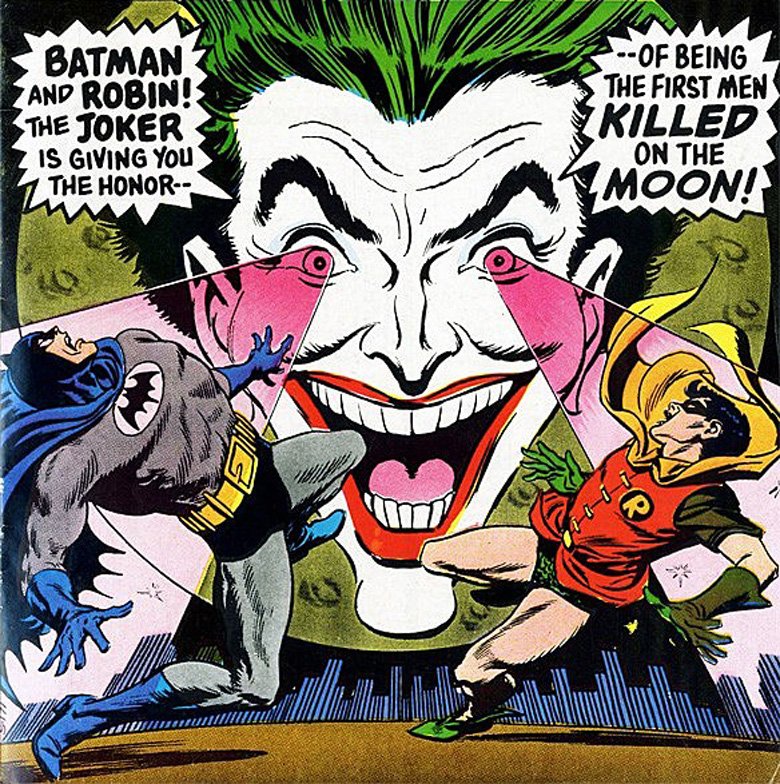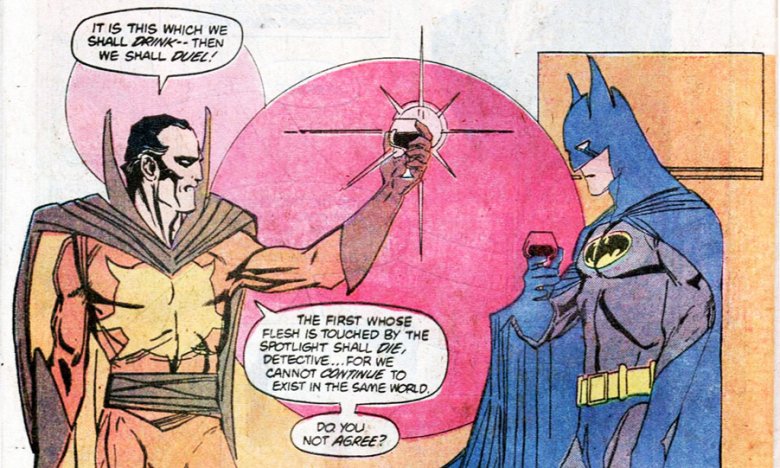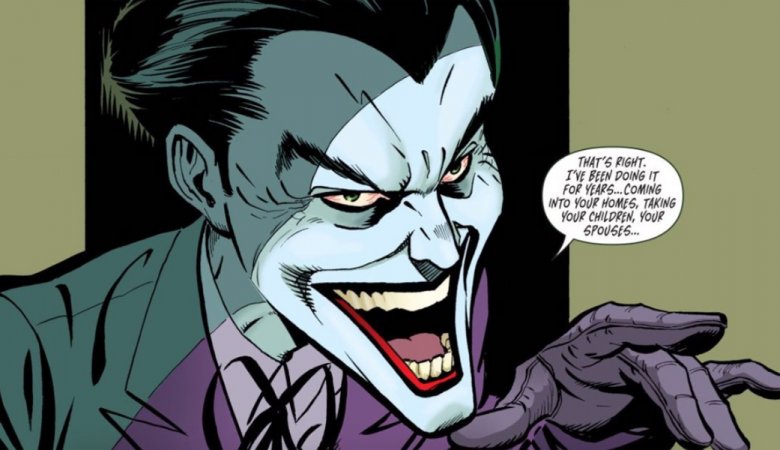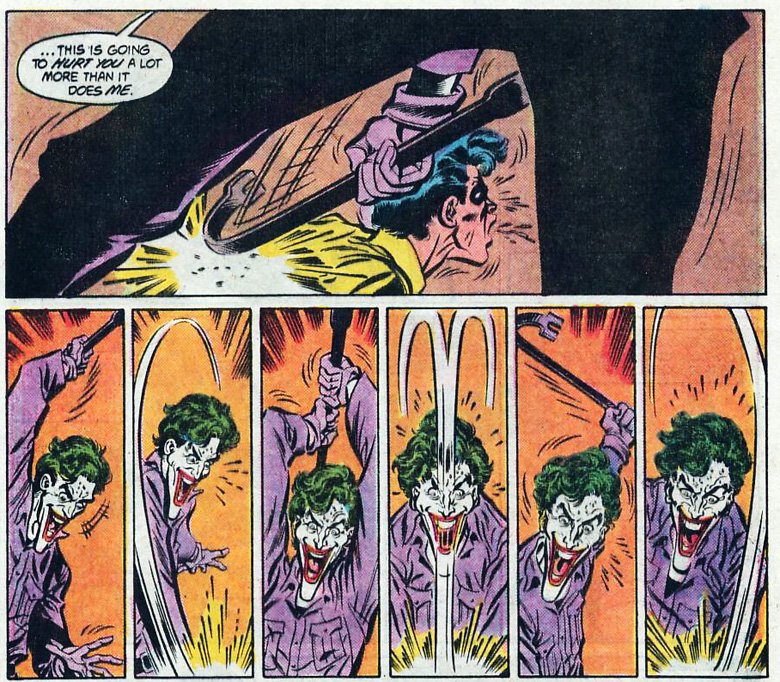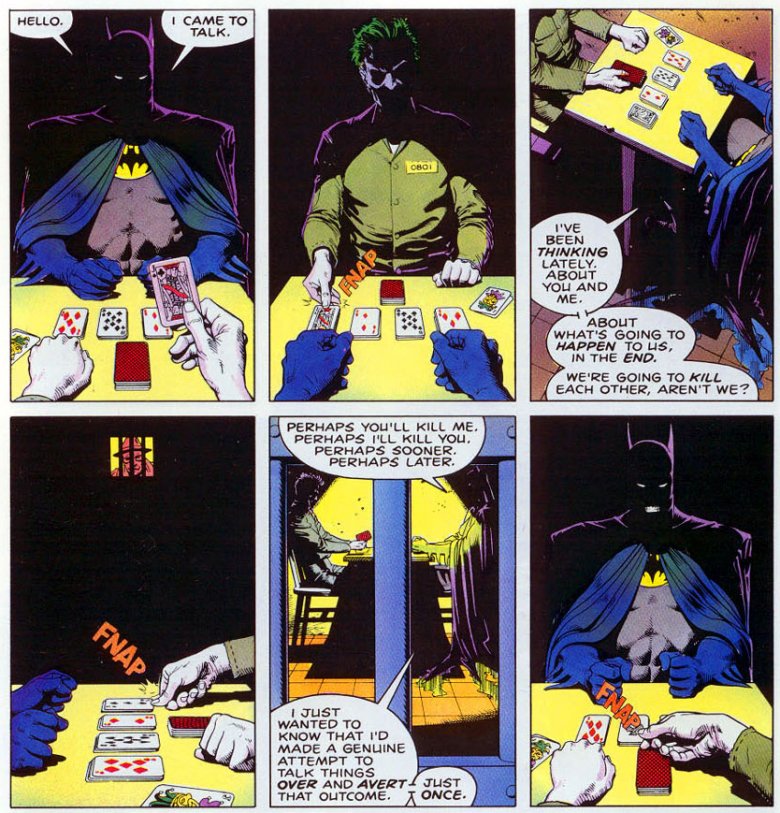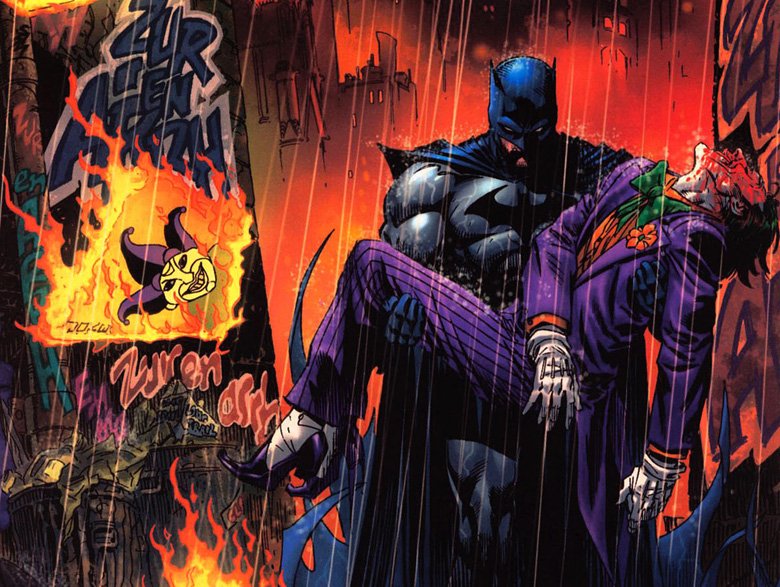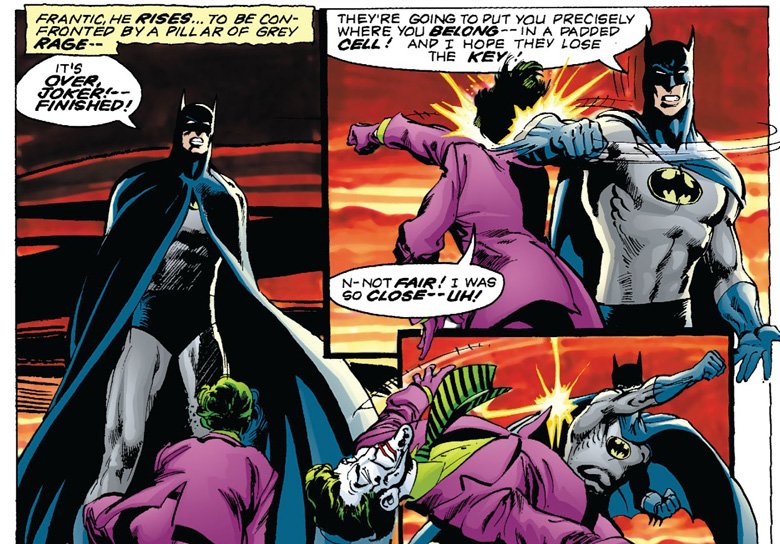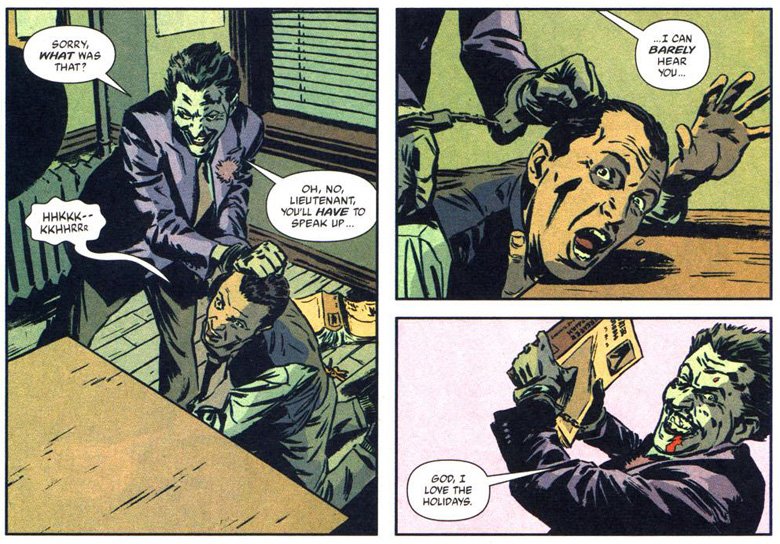That's What's Up: The Real Reasons Batman Won't Kill The Joker
Each week, comic book writer Chris Sims answers the burning questions you have about the world of comics and pop culture: what's up with that? If you'd like to ask Chris a question, please send it to @theisb on Twitter with the hashtag #WhatsUpChris, or email it to staff@looper.com with the subject line "That's What's Up."
Q: Okay, once and for all, why doesn't Batman kill the Joker? – via email
Mark Waid once said that the entire conceit of the superhero, all 75 years of tropes, genre conventions, and stories, is an inverted pyramid that rests on a single point: that no one can tell Clark Kent is Superman, the most famous person in the entire world, because he puts on a pair of glasses.
Point being, there are some things about superhero comics that you just have to accept as part of the price of admission. As fun as it might be to argue about why things work the way they do—like that one story where you find out that Superman is unwittingly brainwashing the entire world with a previously unknown psychic power so they see "Clark" as a balding milquetoast—there's a certain level of suspension of disbelief that you have to bring to the table. Batman never actually killing the Joker, even when it's clear that it would solve at least half of Gotham City's problems, is absolutely one of those strings that you can't pull on too hard without seeing the whole thing collapse. But if you really want to know, you're in luck: this is a subject I've put a lot of thought into over the years.
The simple answer
The question of why Batman doesn't kill the Joker is a weird one. Like most questions people have about why things happen in comics, it treats the DC Universe as something real, where there should be realistic consequences to, you know, being a genocidal murder clown. The thing is, the answer to that question—the actual, definitive answer—exists entirely in our world, where Batman is a fictional character designed to appear in movies, TV shows, and at least four comic books every month, in perpetuity, to make giant stacks of cash money for the Warner Bros. corporation. And it's a pretty simple answer, too:
If Batman kills the Joker, we can't have any more Joker stories. He is, in very blunt and realistic terms, too popular to die.
And he's been that way since the beginning. If you're up on your comics trivia, you probably already know that the Joker, like Catwoman, made his first appearance in 1940's Batman #1. What most readers don't know, however, is that he made his second appearance in that same issue. From the moment Jerry Robinson first sat down and drew that face, stuck permanently in a rictus grin inspired by Conrad Veidt in The Man Who Laughs, he clearly knew he'd created the perfect foil for the dark, spooky hero that Bill Finger and Bob Kane had debuted only a year earlier in Detective Comics #27.
It's easy to see why he would, too. When Kane wanted to jump on the bandwagon of new superheroes that exploded onto the scene in the wake of Superman's initial (and immediate) success, Finger suggested that they distinguish their creation by giving him the scalloped, pointy-eared, bat-winged cape and cowl that made him look like a half-Dracula, half-Satan. When that's your hero, giving the villain a permanent grin and a bright purple suit makes for a fantastic contrast.
The Man Who Laughs
If you've never read them, those original Joker stories were actually pretty close to what we see from today's Joker, to the point where the same plot has been re-told a couple of times in some of the definitive "modern age" Joker stories—"Sign of the Joker" and "The Laughing Fish" by Steve Englehart and Marshall Rogers from 1978, and Ed Brubaker and Doug Mahnke's Batman: The Man Who Laughs from 2005. And it's also worth noting that while the first Joker story ends with the Clown Prince of Crime being punched out and locked up in jail, the second ends with him apparently dying during a fight with Batman, only to be revealed to still be alive in the last panel, a pattern that would repeat itself pretty often.
That initial contrast of the smiling murderer and the scowling, spooky hero—who, despite being a gun-toting killer himself in the earliest stories, had sworn off killing by 1940 once Finger figured out that he wanted to do something that wasn't just ripping off the Shadow—made him the perfect foil, and he quickly became Batman's arch-enemy. Even by the turn of the Silver Age, when Batman started moving away from his pulpier roots and into brighter superheroics, he remained one of the most prominent villains—although there was a period in the early '70s where, after the end of the TV show, the Joker was absent from the comics page for four years, something that seems unthinkable today.
All of which is to say that Joker stories sell. They sell a lot, and on top of that, he's an interesting character that creators like to write about as much as fans like to read about him. He's a fun foil, and he's incredibly adaptable to virtually any story, much like Batman himself. Maybe even more so, because the Joker by his very nature as an unpredictable, chaotic madman, is allowed to get weird. Really weird.
It's not all murders, sometimes it's moon crimes
When people ask why Batman doesn't just kill the Joker, the question they're really asking is why Batman, having gone through decades of stories where the Joker murders, tortures, destroys, and devastates Gotham City, doesn't just go ahead and employ the obvious permanent solution to the problem.
The simple answer is that nobody, not even the people asking that question, actually want that. If Batman does permanently, 100 percent dead-is-dead kill the Joker, then one of the most popular characters in comics—a cash cow who, in his own way, is more popular than most superheroes—is gone. Even if you think the character is inherently uninteresting, then I'd suggest that you don't really want there to be no more Joker stories, you just want there to be better ones. And on top of that, it's a story that cannot possibly work.
I don't mean that it can't work because of all of the in-story reasons that come along with Batman breaking his code against killing and actually murdering someone, although those are pretty big problems too. I mean that it can't work from a pure storytelling standpoint. The Joker's literal, monetary value as a going concern makes it absolutely impossible for him to actually stay dead, which means that if Batman actually does kill him, not only is it not actually the permanent solution that people are suggesting, it means that before long, Batman would have broken that code and permanently altered his character for nothing. If he can't even get a simple thing like murder right, then why are we even reading about him?
Messiah of the Crimson Sun
You'd actually have an easier time selling that story if Batman "killed" the Joker while knowing full well that he'd eventually be back, which I know because that's something that he's actually done. Not with the Joker—although Scott Snyder, Greg Capullo, Danny Miki and FCO Plascencia's "Endgame" arc comes pretty close—but with Ra's al-Ghul, a character who's literally defined by his ability to come back from the dead.
In a relatively obscure story called "Messiah of the Crimson Sun," by Mike W. Barr and Trevor Von Eden in Batman Annual #8, Batman absolutely kills Ra's by burning him to ash with a laser beam in space. When Robin calls him out on it, Batman's response to being told he just killed someone was a stone-cold shrug and "Have I?" Like the reader, he knows full well that Ra's is going to be back because that's what he does, but giving the characters in the story that kind of genre awareness is a difficult trick to pull off without taking a sledgehammer to that inverted pyramid we were just talking about.
To be fair, the Joker has returned from an apparent death about as often (and maybe even more) than Ra's has, but his apparent immortality isn't the product of something within the story. It's from the very real concerns of our world, a mandate that comes down from simple economics and the desires of creators. Batman will never kill him because he cannot die.
But that's also the problem.
The Joker gets scarier
The really fascinating thing about why Batman can't kill the Joker is that it's the perfect intersection of a real-world concern that has to be justified in the story, and how that justification becomes exponentially more difficult over time.
It's very easy to justify Batman not killing the Joker when he's robbing banks and committing moon crimes, even if there's an occasional murder thrown in to keep him scary. No one ever asks why Batman doesn't just drag the Riddler out back and shoot him, you know? But after that four-year gap, when the Joker was reintroduced and redefined in stories like "The Joker's Five-Way Revenge," where he was made decidedly more murderous, things started to push in the other direction.
The Joker had always been special, but by the time we got to the '80s, he was the arch-nemesis for Batman, in a way I'm not really sure he'd been since those earliest stories in the '40s. And as Batman himself was redefined for a new era, with his relentless dedication and unstoppable physical prowess ramped up to full-on action movie status as creators sought to distance him from the perceived silliness of Adam West, the Joker was forced to become every bit as unstoppable, just on the other side. This was when it was truly underlined with every appearance that he was Batman's opposite, and if Batman was going to be the greatest hero in the world—and thanks largely to the success of books like Dark Knight Returns and The Killing Joke, DC pretty much decided he was going to be their top guy—the Joker had to be the absolute worst villain.
And we all know how that went.
A Death in the Family
Within the span of a decade, the Joker went from being a murderous villain whose crimes were always based around some sort of comedic nonsense to being the psychopath who shot and assaulted Barbara Gordon and tortured her father in an effort to get Batman to embrace nihilism, then giddily beat Robin with a crowbar and tried to murder the entire United Nations building two issues later. And all that happened in one year.
By the end of the '90s, the Joker was leaving a body count in the double digits at minimum every time he showed up, and being pretty consistently characterized as an irredeemable monster. With that being the case, it was easy to read those stories and come away with that same question. If we're suspending our disbelief enough to accept these stories as having their own kind of reality, then couldn't Batman prevent all that death and suffering by just killing the Joker? It's not like anybody's really going to miss him.
That's actually the argument that Jason Todd brought up when Judd Winick, Doug Mahnke, and Eric Battle brought him back to life with a pretty understandable grudge in 2005's "Under the Hood," which brings us back around to the in-story reasons why he can't ever kill his oldest, deadliest enemy.
The Killing Joke
The argument that Winick and Battle put in Batman's mouth is that murder is sort of a "once you pop, you just can't stop" situation, and that if he ever killed the Joker, he'd be unable to stop himself from killing every other criminal who got in his way, raising the question of just where you draw the line. In the story, Jason finds that argument to be incredibly frustrating, and as a reader, I'm right there with him. I mean, seriously, you're telling me that Batman is incapable of discerning between a guy who turned an entire city into smiling zombies and led a death parade through the streets, and, like, Kite-Man? Really?
But at the same time, there is a reason that I find to be perfectly acceptable, because there has to be. As much as you don't want to start pulling bricks out of the Jenga tower that is comics, the things that happen because of external reasons (like the Joker's popularity) have to be justified in the story, or else the whole thing falls apart on its own. It's not about realism, it's about logical consistency within the narrative. And Batman's attitude on killing the Joker actually has that.
At the end of the day, it's not about the Joker at all. It's about Batman.
Not exactly a happy ending
I am very passionately attached to the idea that Batman doesn't kill, because, in all honesty, it's the only way he really works.
A lot of readers mistakenly think that was an edict that was handed down due to the Comics Code's arrival in 1954, but the truth is that Batman's more violent tendencies were curbed pretty early on. The guns disappear by the end of that first year and he says on-panel that he never kills only a few months into 1941 once Finger, Robinson, and Sheldon Moldoff start figuring him out—and to give you an idea of how long that took, consider that he didn't even have an origin story and a pair of dead parents until six months after his first appearance.
I will admit that they were probably trying to make him more appealing to younger readers. The edict against killing was, after all, set in stone shortly after Finger and Robinson introduced Robin as Batman's kid sidekick, which was probably at least a little motivated by Superman's overwhelming popularity with kids, another one of those external motivations for internal storytelling.
Back to the cell
Whatever the motivations, they hit on something that would form a fundamental truth of the character, just like they did with Robin's arrival and the idea of Batman creating a new family.
With Batman's code against killing, they reinforced the idea that we see in his origin story, that while the costume and the name might come later, Batman has his roots in a moment of someone taking a life—two lives, if you want to be technical about it. That's the thing he's reacting to, the tragedy that he defines himself in opposition to, and the thing that he's always trying to prevent: death. If he's going to use that tragedy to become something better, that "new kind of man" that Grant Morrison wrote about in his run, then he has to be different from the thing he created. He can't pursue death, any death, as a goal, because it's anathema to everything he represents. He's a crimefighter, and while he might fight bank robbers when they're around, the taking of a life is the definitive crime that made him one.
Even beyond that, he runs into the same problem you often see with Superman, in that killing makes him seem far less heroic and a lot more frightening. There are already readers who make the case that Batman's a fascist because he's a rich guy who beats up the mentally ill while driving around in a rocket-powered symbol of his extravagant wealth. It's easy to make the counter argument, but if he becomes a killer, then forget about subtext, that becomes an unavoidable function of the actual text.
With all that in place and decades of stories built around shoring up those ideas, then the simple fact is that Batman can't kill anyone and come out the other side as the same character. It's the immutable line, regardless of what other characters, even the Joker, are doing around him. That, combined with the differences between the core conceits of the superhero comic and the action movie genre, where the hero always kills the bad guy at the end, is where that frustration and that question come from.
Nobody's arguing that he doesn't deserve it, though
Besides, don't forget that Batman lives in a world where ghosts are 100 percent real. If you thought the Joker was trouble when he was bound to this mortal coil, you absolutely don't want to know what happens when he starts pinging the PKE meter.
Each week, comic book writer Chris Sims answers the burning questions you have about the world of comics and pop culture: what's up with that? If you'd like to ask Chris a question, please send it to @theisb on Twitter with the hashtag #WhatsUpChris, or email it to staff@looper.com with the subject line "That's What's Up."
